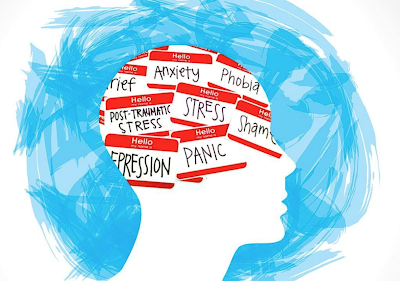4 Tips for Supporting a Friend who is Struggling
Supporting a Loved One with Mental Health Concerns
Sometimes, it can be really hard to see a family member or friend go through a difficult time in their lives. Things can be even more difficult when you notice or find out that a friend may be struggling with a mental health concern. Sometimes we may feel “stuck” or unsure about how to best support a loved one who is going through so much. I know I have felt that way at times! In today’s post, I will be discussing some ideas and tips that you can use to support a friend who is struggling with their mental health.
*Note* These tips are personal to my own experiences of supporting a loved one who is going through a hard time. The tips I have shared are not advised as professional advice. Brief mention will be made about abuse, trauma, self harm and suicide.
When we see a loved one struggle with their mental health, we often want to do our very best to support them. For myself, I always want to support my loved ones including for those who have a mental illness and who have been through trauma. I would love to share with you some personal tips that I have learned from helping loved ones and others while working in the mental health field. I have found these tips really helpful for myself when I am supporting a friend who needs to talk and or who is having a mental health crisis.
Here are some personal tips, based on my experiences, to support someone who is struggling with their mental health:
1. Engaging in active listening can be really helpful
When we are supporting a friend who is struggling mentally or emotionally, I believe it is important to be fully present when speaking to your loved one. Active listening can be crucial when it comes to supporting a loved one or friend. Active listening you may ask? Active listening involves being fully present in hearing what a person is saying and conveying through your responses that you understand. By listening carefully to our friends who reach out to us, we can let them know that we are here to support them and that we hear what they are expressing. Even if you don’t fully understand what your friend may be going through, listening to them in their concerns, feelings and issues can be really supportive.
There are many ways verbally and non-verbally that you can express to your friend that you are engaging and listening to them. I have attached a video below that summarizes some great tips about listening! Here are also some of my examples that I have utilized in my conversations with my loved ones and from what I have learned in my studies with mental health:
- Acknowledge or validate a friend's feelings
- Ask more open-ended questions (ex. How have you been feeling the last couple days?)
- Clarify with a friend that you understand what they are trying to say. (ex. Sounds like you are feeling worried, would you say that is close to how you are feeling?
- Utilize eye contact and have a calm, open body posture
- Don't interrupt or talk over a friend when they are speaking
- Use verbal and non-verbal prompts (ex. Nodding, smiling, saying phrases like “okay" or "hmm" as examples)
2. Empathy, empathy and empathy!
There can be a big difference between being empathetic and sympathizing to a friend who is struggling. Sympathy is feeling sorrow for someone who is struggling meanwhile empathy is understanding a person's feelings and putting one's self in another person's shoes. I believe both are important! However, I feel having empathy towards your loved one is super important especially if a friend is discussing very deep topics such as mental illness or self harm. Being empathetic, from my experiences, is not just about listening attentively. Being empathetic means to acknowledge and let a friend know that you are trying to understand where they are coming from. Showing that we understand or that we are trying to, can allow another person to feel that they aren't alone.
We can show empathy to our friends in the conversations we have with them! We can try our best to be understanding, patient and respectful when a friend opens up about an important concern. We can also show empathy to our friends who are struggling by being non-judgmental and by being open-minded in conversations. Below I have attached a really great video by Brené Brown where she speaks about empathy and what the difference between sympathy and empathy is!
3. Make sure to take care of your own mental health too!
Sometimes it can be really hard emotionally to see or hear a friend go through a hard time! Sometimes it can feel very overwhelming to talk about heavy topics as well. For example, I remember one friend that reached out to me about domestic abuse. I fully supported my friend and listened to them lots especially about what happened and with how things were going for them moving forward from the abuse. At times however, I found that hearing about such heavy abuse was very hard for me emotionally to cope with. I felt very upset for my friend that they went through something so horrible. I also found myself feeling really down especially as time went on.
From my experiences, know that it’s okay to feel upset when we we hear about a friend who is struggling. We are all human and our emotions can show us how much we care for others. As you are supporting a loved one, it is super important to take care of yourself while supporting them. You aren’t terrible or selfish for taking some time for yourself whether it be for self care or for some space. Reach out to someone you trust if you need to talk about how you have been feeling. Some topics of discussion can be very heavy emotionally and it’s okay if you need to reach out for support too. It is also extremely important to reach out to someone if you feel that you or a friend are having thoughts of suicide or self harm. Both you and your loved one's mental health matter very much!
4. Remember that you are enough!
When I see that a loved one of mine is in distress, I sometimes feel unsure about how to best support them. At times, I have felt that I am not doing enough for them. From what I have learned from my experiences, I feel that each person is enough and that there is only so much that a person can do to help another person. If you are supporting a friend right now, know that you are enough as a person! It’s okay if you are unsure sometimes about what to say to a friend who is struggling with a mental health concern. Even if you may feel that you aren’t doing enough for them, just being present with your friend is so very helpful. Supporting a friend through asking, listening and caring is so valuable! I think it is great to check in, listen and spend time with your friend. Talking with someone who is struggling and offering them support is very helpful and empowering. If however you feel your friend needs more support, know that it is okay to refer or offer them different resources in order to better support them in what they may need. We must respect our boundaries in ways that best supports our mental health, our loved ones and our relationship with them.💗
The tips I have shared with you are by no means professional! I have shared some of these tips based on my own experiences of supporting others. If you are supporting a friend right now, I applaud and support you! There are many different ways of reaching out or supporting a friend who is going through mental health concerns. Below I have listed some online resources related to helping others who are going through a hard time including with mental illness, suicidal thoughts and trauma.
Thank you for taking the time to read this post! I send my very best to each reader including to those who are supportive of their loved ones who are struggling lots right now (you are a champ and I hope all will be well). Please leave any comments or questions if you have any including if you wish to share some of your tips about supporting a friend in need. Stay safe and take care of yourselves! ❤
Resources and Links:
https://www.beyondblue.org.au/the-facts/supporting-someone
https://www.bbrfoundation.org/blog/how-support-someone-mental-illness
https://hellogiggles.com/lifestyle/how-to-help-a-friend-through-trauma/
https://www.mentalhealthcommission.ca/English/document/60986/helping-yourself-and-others-after-experiencing-traumatic-event-building-self-care-pla
https://www.medicalnewstoday.com/articles/326850#conclusion
https://www.bbrfoundation.org/blog/how-support-someone-mental-illness
https://hellogiggles.com/lifestyle/how-to-help-a-friend-through-trauma/
https://www.mentalhealthcommission.ca/English/document/60986/helping-yourself-and-others-after-experiencing-traumatic-event-building-self-care-pla
https://www.medicalnewstoday.com/articles/326850#conclusion




Comments
Post a Comment